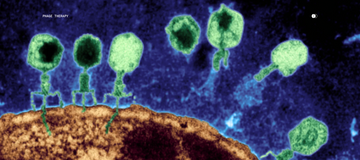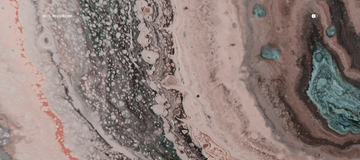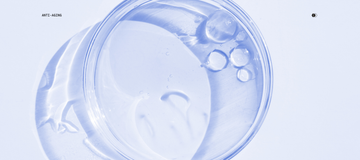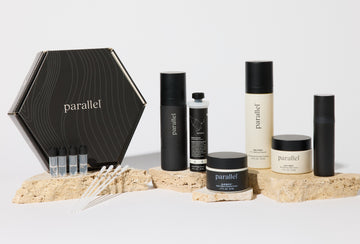It’s been over two years, and we’re still wearing masks in certain environments and circumstances. If you’ve ever had a breakout or inflammation caused by a mask or tight clothing, you’ve likely experienced acne mechanica.
What is acne?
Acne is a multifactorial dermatological issue that often develops as a cumulative effect of various factors. That means that acne can be caused by things you can control – like your diet, climate/environment, stress, products you use, clothing or other mechanical forces, and other habits or behaviors, as well as things you can’t control – like your hormones/altered levels of androgens and human genetics/inheritance. In general, when we talk about acne, we mean it to refer to inflammation of the pilosebaceous units of the skin. Individuals suffering from acne present with characteristic lesions that include cysts, nodules, white comedones, black comedones, pustules, and inflammatory papules. Not only does acne cause lesions, but it may also lead to scarring of the skin and can give rise to pigment alterations, which can last for a long period of time, sometimes years.
Today, we focus on acne mechanica, which is acne caused or exacerbated by “mechanical forces.” Acne mechanica is relevant today, especially given that we’ve had to wear masks for the last two years and may continue to have to wear them off and on in the future to prevent the spread of COVID and its ongoing variants.
So what is acne mechanica, actually?
Acne mechanica refers to inflammation and lesion eruption in areas of skin that are subjected to increased mechanical stress. Mechanical stress includes rubbing, pinching, stretching, pressure, friction, or occlusion of the skin. Acne mechanica can exacerbate acne vulgaris (the more common type of acne), but may also arise in individuals who do not have pre-existing acne. Mechanical stress of physical trauma elicits local irritation leading to the development of acne mechanica.
What are the causes of acne mechanica?
The factors responsible for eliciting acne mechanica vary in different parts of the body, but these are common causes. Do you do any of the following?
- Acne mechanica on face and neck
- Support your head against your hands
- Touch your face with your fingers, sometimes rubbing
- Wear hats or use bands that touch your forehead
- Wear chin straps
- Use athletic head-and-face guards
- Wear helmets in sports (i.e. in football, hockey, etc.)
- Wear turtleneck sweaters or scarves
- Wear shirts with collars that might be abrasive
- Acne mechanica on shoulders, back, chest, arms, or buttocks
- Use pads for sports (i.e. football)
- Use surgical tape
- Use backpacks that have straps touching your skin
- Use orthopedic casts
- Wear clothing that rub against your skin or are tight fitting
- Sit or lean on chairs that have abrasive fabrics
- Are confined to a bed
- Wear tight fitting bras
We’ve seen a spike in acne mechanica in the last two years, likely due to frequent and prolonged use of masks and protective gear during the global pandemic. Some of you might have heard the term 'maskne,' which refers to acne caused by mask-wearing. Friction between skin and mask can make the skin warmer, more moist, and more compressed, which in turn can imbalance the skin microbiome, meaning that certain bacteria overgrow. Wearing a mask for long periods, for example on planes and while traveling, can result in increased mechanical stress. Maskne may even lead to exacerbation of acne already present on the masked area of the face.

How To Treat Acne Mechanica?
The first step in the treatment of acne mechanica is to try to eliminate its underlying cause when possible. Refrain from activities, clothing, or coverings that rub, pinch, stretch, or irritate the skin. Do not over-exfoliate; increased friction while scrubbing and cleansing may further aggravate the symptoms of acne mechanica. If acne mechanica is caused by mask-wearing, try going outside without a mask to let your skin (and good microbes) breathe. Additionally, you can try the following product solutions:
- Targeted phage-based serum: if you identify the issue causing bacteria on your skin, you can find the right phage-based serum that can balance your skin microbiome, reduce inflammation, and promote healthy, resilient skin (want to learn more? Sign up HERE)
- Alpha and beta-hydroxy acids (AHA and BHA): AHAs promote collagen synthesis and epidermolysis, whereas BHAs promote corneocyte desquamation (exfoliation) and comedone breakdown.
- Retinol: Retinol normalizes keratinization, reduces cohesion of keratinocytes in microcomedones, and alters cellular proliferation and differentiation.
- Topical Zinc: Zinc therapy suppresses sebum production and has anti-inflammatory effects for the treatment of acne
- Topical Nicotinamide or vitamin B3: these ingredients suppress the release of inflammatory cytokines and improve acne associated with inflammation
Have questions about acne mechanica, “maskne,” or balancing your skin microbiome? Reach out to us at hello@parallelhealth.io.
—------------
If you haven’t already, sign up HERE to share your skincare journey and get on the waitlist for personalized tests and products.
About Parallel
A parallel world lives amongst us: the microbial world. This world impacts not only our lifespan, but also our healthspan.
Our mission is to empower people with real science to make meaningful decisions to improve their healthspan.
Parallel is a clean, science-based skin microbiome health company providing effective, personalized skincare, powered by genomics.




























